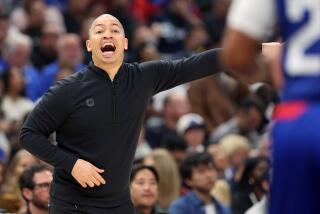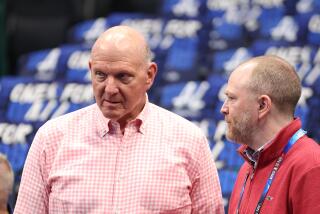This Isn’t a Salary Drive for Anderson
- Share via
At the start of training camp, most talk about the Clippers revolved around Maurice Taylor’s unhappiness about the team’s decision not to grant him a long-term contract.
Overlooked was Derek Anderson, who, like Taylor, will be an unrestricted free agent next summer.
Anderson, picked up in a trade from Cleveland during the off-season, is in his third season in the NBA. He loves to compete and has quietly emerged as one of the team’s leaders.
Over the first five games, Anderson has backed up his leadership with his play. He’s averaging 19 points, six rebounds, 3.8 assists and a steal, and is coming off an impressive 28-point, seven-rebound, four-assist performance in a loss to San Antonio on Wednesday.
“I had to get situated and become familiar with the players on this team to know my role,” Anderson said. “I didn’t come here to be a scoring leader, but there are going to be times when I have to establish myself.”
Anderson said he’s not pressuring himself to have a big statistical season because he believes his value will rise if he’s a part of a turnaround for the Clippers. “I’m not pressed into anything. I know I can score,” said Anderson, who has made 31 of 33 free throws. “But I realize that it takes five guys to win. You don’t want guys to go start looking for themselves. I understand that’s what happened here last year. Once you start that, it can get contagious.”
*
Tyrone Nesby is having a miserable time with his shooting. He’s shooting 34.7% and making only 64.7% of his free throws. Last season, he shot 44.8% and 78.2%.
Nesby, who made one of 11 shots against the Spurs, lost his starting position at small forward to Lamar Odom but is getting the same playing time, 25 minutes, as he did last season.
The new no-touch rules on the perimeter have bothered Nesby the most. Odom has played 30 more minutes but has four fewer fouls than Nesby.
“Everyone is supposed to play with the new rules but it seems that we’re the only ones they practice the calls on,” Nesby said. “The big teams still play like they always have but most of the time they don’t get called for fouls under the new rules. We do.”
More to Read
Go beyond the scoreboard
Get the latest on L.A.'s teams in the daily Sports Report newsletter.
You may occasionally receive promotional content from the Los Angeles Times.







